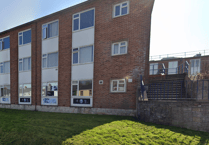The deployment of more than 150 CCTV cameras in West Wales has been “value for money”, the Dyfed-Powys police and crime commissioner has said.
Dafydd Llywelyn was speaking about a £1.3 million investment in 23 towns in Pembrokeshire, Carmarthenshire, Ceredigion and Powys.
“I have not met a serving police officer that does not agree with the sentiment that CCTV is a powerful tool, and supports it 100 per cent in their work,” he said.
The roll-out of CCTV was a key priority for the incoming commissioner in 2016.
The deployment and day-to-day use of the cameras have been assessed by the Dyfed Powys police and crime panel, which concluded that they delivered operational benefits and also made the public feel safer.
But the panel also heard from members of the public who felt there was a risk of the cameras intruding into private lives.
Privacy impact assessments have to be carried out for each camera installation, and then reviewed regularly.
Mr. Llywelyn said crime pattern analysis was the basis of communities being selected for CCTV cameras, and that the force followed guidance – for example not extending their use into residential areas, or parks.
There was, he said, “a fine balance between justification and proportionality”.
He added that cameras could be deployed “discreetly” for specific operational purposes, such as by a property where drug-dealing was taking place, but that a surveillance commissioner would monitor this.
A crime panel report said the force-wide CCTV cameras monitored an average of 414 incidents a month and were used a further 67 times to help find missing people.
The system, it said, did not make use of facial recognition technology.
Footage from the cameras since their deployment has included a grievous bodily harm case outside The Met Bar, Llanelli, where a victim was knocked unconscious with a single punch in 2018. The suspected pleaded guilty and was sentenced to a 20-month jail sentence.
CCTV operators have also helped disrupt drug-dealing in Llanelli, prevent anti-social behaviour at a multi-storey car park in Haverfordwest, and identified what were termed “professional beggars” in town centres.
The report said crime within 100 metres of the cameras had reduced by just over a third on average.
It also said that operators have monitored protests by Black Lives Matter, Extinction Rebellion and Penally migrant camp demonstrators.
There was no reference to any potential displacement of crime as a result of the deployment of cameras, but Mr. Llywelyn raised it during the meeting.
Displacement was, he said, something he and Dyfed-Powys Police were mindful of.
“But at the moment it’s too much in its infancy to assess whether any of that is really taking place,” he said.
Mr. Llywelyn said the cameras would need to be maintained and replaced after 10 to 15 years, and that he wanted to see other organisations, like county councils, partner up with police to benefit from their use.
Panel members asked if cameras could be deployed in rural areas, and whether a sinking fund for their eventual replacement had been set up.
Councillor and former magistrate Ken Howell said CCTV cameras were also of benefit to the Crown Prosecution Service (CPS).
Reflecting on his time as a justice of the peace, he said: “I felt at the time that the CPS should be contributing to the cost.”




